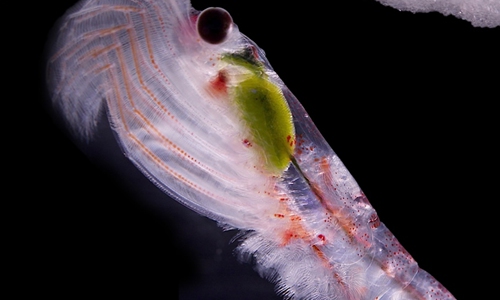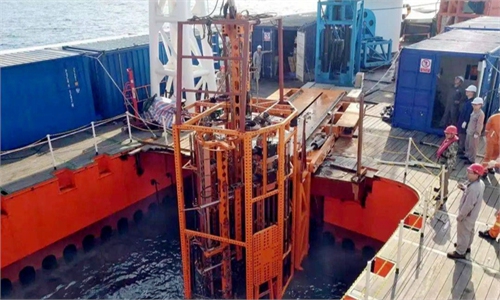ARTS / ART
Scientists find out how Antarctic Krill adapted to extreme climate

Scientists have decoded the secrets of the genes of Antarctic Krill, explaining the reason why such small creatures have been able to adapt to the extremely harsh climate of the South Pole, according to a recent report published in the journal Cell. Photo: Courtesy of Dr.Fan Guangyi
Scientists have decoded the secrets of the genes of Antarctic Krill, explaining the reason why such small creatures have been able to adapt to the extremely harsh climate of the South Pole, according to a recent report published in the journal Cell.
The research, carried out by the Yellow Sea Fisheries Research Institute of the Chinese Academy of Fishery Sciences (CAFS), was a joint effort by scientists and researchers from countries including China, Germany and Australia.
The scientists used genome sequencing data to learn how Antarctic Krill have adapted to the Southern Ocean and how they shaped the local ecosystem.
It turns out that Antarctic Krill have a complicated, high-level genetic duplication in their DNA.
Due to this duplication, the sequence for Antarctic Krill is the largest animal genome sequence produced to date, according to the report. At 48 gigabytes, the sequence is 20 to 30 percent bigger than that of African and Australian lungfish.
In addition, the research team also found out that Antarctic Krill, whose genome is around 16 times longer than that of a human, have a total of 25 significantly expanded gene families. It means that "krill can continuously molt, or shed its outer layers as the organism grows, generally supporting its lifecycle in the Antarctic environment," Dr. Fan Guangyi, co-corresponding author of the report and a researcher at BGI-Research, noted to the Global Times.
With regards to adaptability, some Antarctic Krill genes imply that the species may have developed physical and behavioral traits that allowed them to preserve energy and live in extremely low temperatures and under various light conditions.
The research found out that the population of the species has also experienced a roller-coaster up and down due to changes in climate.
Antarctic krill's population once decreased around 10 million years ago, which coincided with severe climate events during what is commonly called the "Ice Age." Additionally, around 100,000 years ago, the population expanded due to a flourishing of sea ice.
"In the context of the entire Antarctic food chain, the role of Antarctic Krill is significant and deserves protection both for the continuation of the local ecosystem as well as for conducting further research into its genetic history and lifecycle," noted Fan.


